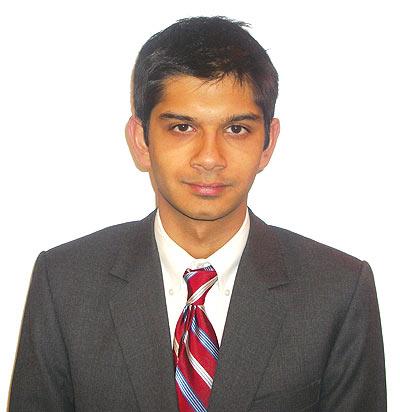Arthur J Pais New York
In the second part of a series on Indian Americans who have won the George Marshall Scholarship in 2012, Arthur J Pais profiles Harvard alumnus Aditya Balasubramaniam, who has worked in the slums of New Delhi and discusses what this academic opportunity means to him.
Part I: He won a scholarship for his HIV activism in the US
During one of his first visits to India, Aditya Balasubramanian, son of a World Bank official who grew up in Maryland and Istanbul, felt uneasy looking beggars in the eye.
He was afraid, and felt guilty.
In his elementary school, he began dreaming of amassing great wealth and distributing it to the poor. He was assuaging his guilt, he admits.
In high school, he became aware of his naivete and began searching for sustainability in poverty reduction efforts.
"I was becoming enamoured by the idea of helping the poor help themselves," said Balasubramanian, who took a year off his history and economics studies at Harvard to work with a project in New Delhi's slums.
Long before he began studying at Harvard, he had been convinced that educational empowerment was a good way to help people escape the low-income trap. So he tutored underprivileged children. But once he graduated from high school, he felt frustrated that his efforts were too small.
Harvard gave him new vision and strength, he said.
"Amartya Sen involved me in his economics, human rights, and food access research, as well as on a project to bring education and jobs to India's poorest state by reconstructing a university," Balasubramanian wrote in his Marshall Scholarship essay.
"Energetic peers on the Harvard International Review helped me publish issues on topics like disease, labour in a globalised world, and the United Nations."
"The World Bank's former chief economist, Justin Lin, worked with me to articulate, in a widely comprehensible Review article, his concern about the consequences of funds available to developing countries drying up in the wake of the global financial crisis. These collaborations inspired me to build on my initial efforts towards sustainable development and abandon my original skepticism."
He came to know of the Abdul Latif Jameel Poverty Action Lab, which evaluates development projects in fields ranging from health care to climate change.
Balasubramanian said he found in J-PAL's pragmatic approach a rejection of the macro-level theories on poverty reduction that seemed disconnected from implementation issues. The results of its small but successful experiments could be scaled up, he felt.
He returned to New Delhi last year, to investigate the efficacy of two report card campaigns on public service delivery in slums alongside two other J-PAL researchers. The project has Massachusetts Institute of Technology and Harvard professors involved.
The first project involved disseminating information in newspapers on local elected officials' performance to slum voters before an election, to test whether better informed voters rewarded good incumbents and punished poor ones.
The second involved auditing the quality of garbage facilities and toilets under a local councillor's jurisdiction and sending the councillor a report, to see if the information incentivised him/her to improve these facilities.
It was not an easy task, Balasubramanian confessed. "Slum-dwellers, most of them migrant workers, dismissed report cards as pointless," he wrote in the essay.
"Others, suspecting ours to be an illegal campaign run during an election-sensitive time, tried expelling us from their slums."
"Politicians yelled that audits portrayed their municipalities inaccurately. Receiving such feedback could be frustrating."
"But amidst this, we also met people who found the newspaper report cards useful. One elected official even mailed us a letter saying the audit report card caused him to develop an area toilet and garbage dump cleaning plan."
'The diverse responses left me with a number of questions: What does the State owe migrants who have left their rural homes, sometimes fully aware of the hardships of the new life chosen?"
"Why does implementation of welfare programmes break down despite their increasing size and support?"
"How have societies combated inequality in the past, and what lessons might that hold for today?"
"To what extent are politicians colluding in processes that bring about sub-optimal public service delivery?"
The project continues, and he might revisit it in between his studies in the UK.
Balasubramanian, a former Harvard Crimson business editor, hopes to study econometrics and mathematical economics at the London School of Economics.
He will pursue an MPhil in development studies at LSE, incorporating tools of disciplines like anthropology, sociology, and politics to tackle questions beyond the scope of economics and history alone.
Such a master's programme with independent research is not offered in the United States, he pointed out, adding that the world-class experts at the LSE's department of international development would help broaden and deepen his understanding of the field.
"I am most interested in the rising inequality in the United States and India, since they are both countries I have ties to," he said.
The application process for the Marshall Scholarship made him realize, more than ever, what he wanted to achieve.
"Regardless of the outcome," he said, "it is a process in which you learn a lot about yourself and get to play back what you've done and think about your time here and in your field studies. It makes you feel fortunate about all the opportunities you get here at Harvard."


Comment
article